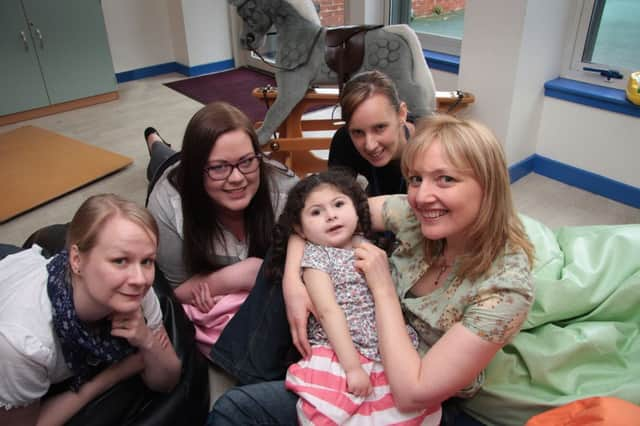Ensuring fun for all our children


A frequent question I have heard in recent weeks from the families I support through Sense Scotland’s Parent Enabler Project is about what they could get their little ones for Christmas. The families we support have children with complex communication difficulties and parents tell us “We’re struggling to find toys they enjoy”, perhaps because their children can’t see or hear toys, or just don’t seem interested in them.
We explore with families the types of toys and play which are most accessible to their children, and what we often find is that the most fun times are not really about the toys, but about play with another person. What children really enjoy is having someone pay attention to what they are focussed on, to join in their games and to take turns with them.
Advertisement
Hide AdAdvertisement
Hide AdWe know from child psychologists that babies are born ready to communicate and interact. At minutes old they respond to an adult’s facial expressions and one-day-old babies have recently been found to imitate one, two or three fingers being held up by an adult. Children with complex communication difficulties are just the same; they are primed to communicate, but their difficulties moving, taking in and processing information can get in the way. We have to pay that bit more attention to notice their signals and find a way of letting them know we are joining in.
One little girl who couldn’t see or hear played amazing turn-taking games, nodding her own head and feeling her mum nod her head back. She also tapped different parts of her body and was delighted when her parents joined in and tapped the same part.
For all of us, having someone notice our responses and respond back lets the fun really start. This is true for all children, and indeed for people of all ages. When something we say or do leads to someone else joining in our conversation or our games, we feel validated, worthwhile and connected.
We are built to share and have connections with others. As babies, we build our emotional resilience through our connections with our caregivers, we learn how to deal with our emotions through them and determine whether it is safe to share our emotions with others.
Developmental psychologists tell us that children cannot manage their own emotions until they are about four years old. Neuropsychologists are clear that the help infants are given to calm down and soothe their physiological reactions to stress, affects how their brains physically develop.
When we are stressed and threatened, our bodies react with hormones such as adrenaline and cortisol, which prepare us for facing danger through physiological reactions such as faster breathing and our muscles tensing up. Because babies are born vulnerable, they are easily threatened. They are reliant on a care-giver, not only to keep them physically safe, but also to help calm down their bodies’ physical response to threat. This could be by soothing them with cuddles and, as they get older, helping them find ways to express how they are feeling. This enables children to feel safe, and when we feel safe, relaxed and loved by someone we trust, the hormone oxytocin is released, which further boosts our feelings of connection and calm. For children who have difficulty taking in and processing information, their threat systems are more easily activated because it’s harder to interpret the world around them, and to know whether they are safe. It is therefore particularly important for these children to have someone they trust joining in their play and providing a sense of safety and connection.
The Scottish Government’s Early Years Framework highlights the importance of all children accessing play and having strong relationships with their parents and carers. Sense Scotland’s Parent Enabler Project and Early Years Programme are making sure this also happens for children with complex communication difficulties:
“These play sessions (with Sense Scotland) equipped me with the skills to play with my baby, the most ‘simple’ thing, that most other mums take for granted,” explained a parent we support. “Playing is such an important part of their lives. Amongst all the bad news and ongoing heartache, I now had a definite way to enjoy my baby and to give her some enjoyment too.”
Advertisement
Hide AdAdvertisement
Hide AdSo with all our children, when we are playing together, laughing and joining in with their games, we can know that we’re building the bond between us, building their (and our own) emotional resilience and maximising their chances of learning.
All this, and having fun at the same time.
• Rachael Tongue is an advisory worker for Sense Scotland’s Parent Enabler Project. For more information email: [email protected]